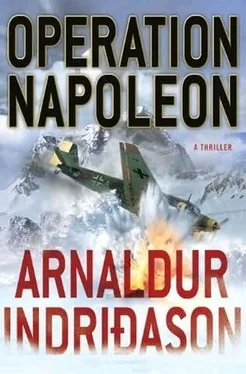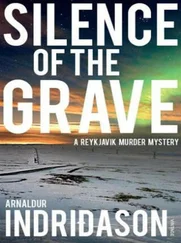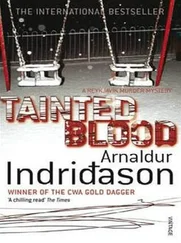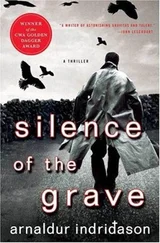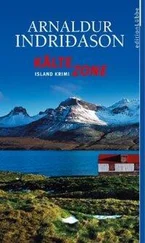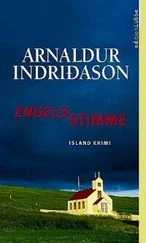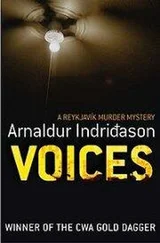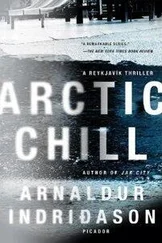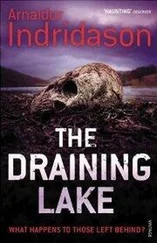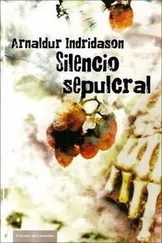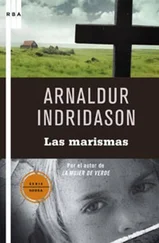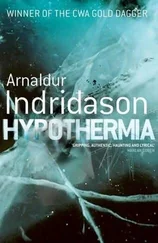On one of the screens were images called up from the organisation’s archives; these held tens of millions of satellite photographs taken over the last four decades. The other showed new pictures. The images Vytautas Carr was scrutinising were of a small section of south-east Iceland’s Vatnajökull glacier, one taken about a year ago, the other earlier that day. The older image revealed nothing remarkable, just the pristine white expanse of the ice cap interrupted by the odd belt of crevasses, but in the new picture, down in the left-hand corner, a small mark was visible. The images were coarse and grainy but once touched up they would be sharp and clear. Carr requested a blow-up of the detail and the image magnified, then resolved itself until the black mark filled the entire screen.
‘Who do we have in Keflavík?’ Carr asked the man at the control panel as he enlarged the images.
‘We don’t have anyone in Keflavík, sir,’ he replied.
Carr considered this.
‘Get Ratoff for me,’ he said, adding: ‘This had better not be another false alarm.’
‘We have better satellite equipment these days, sir,’ the other man said, holding the phone.
‘We’ve never gotten such a clear picture of the glacier before. How many people know about the new images?’
‘Only the rest of the eight watch, that’s three people. Then you and me, of course.’
‘Do they know the situation?’
‘No, sir. They didn’t show any interest in the pictures.’
‘Keep it that way,’ said Carr and left the room. He stalked down the long corridor to his office and shut the door behind him. A light was flashing on his telephone.
‘Ratoff on line two,’ said a disembodied voice. Carr frowned and punched the button.
‘How long will it take for you to get to Keflavík?’ Carr asked without preamble.
‘What’s Keflavík, sir?’ queried the voice on the phone.
‘Our base in Iceland,’ answered Carr.
‘Iceland? I could be there tomorrow evening. Why, what’s going on?’
‘We’ve received a clear image of the biggest glacier in the country. It seems to be returning an object to us which we lost there many years ago and we need a man in Keflavík to direct the operation. You will take two special forces squadrons and choose your own equipment. Call it a routine exercise. Direct the locals to the defense secretary if they’re uncooperative. I’ll talk to him. I’ll also call a meeting with the Icelandic government to offer an explanation. The military base is a sensitive issue in Iceland. Immanuel Wesson will take over our embassy in Reykjavík and act as spokesman. You’ll receive more detailed instructions on the way.’
‘I presume this is a covert operation, sir?’
‘I wouldn’t have called you otherwise.’
‘Keflavík. I remember now. Wasn’t there some wild goose chase there in ’67?’
‘We have better satellites these days.’
‘Are the coordinates the same?’
‘No. This is a new location. That damn glacier keeps moving,’ said Carr and cut short the conversation without saying goodbye. He did not like Ratoff. He stood up, walked over to a large glass cabinet and opened the door, taking out two small keys which he turned over in his palm. One was slightly larger than the other but both were finely scaled, clearly designed for small keyholes. He put them back in the cabinet.
It was many years since Carr had examined the wheel. He took it out now and weighed it in his hands. He reread the inscription: Kruppstahl. It, alone, had confirmed the crash-landing. Its make correlated with the type and size of the plane, its year of manufacture and capacity. This wheel was proof that it was up there on the glacier. After all these years it had at last been found.

FOREIGN MINISTRY, REYKJAVÍK,
THURSDAY 28 JANUARY, AFTERNOON
Kristín closed her eyes. She felt the headache throbbing in her forehead. This was the third time the man had come to her office and launched into a diatribe against the ministry, blaming them for the fact that he had been cheated. On the first two occasions he had attempted to browbeat her, threatening that if he did not receive compensation for what he regarded as the ministry’s mistake he would take the matter to court. Twice now she had listened to his tirade and twice struggled to keep herself under control, answering him clearly and objectively, but he did not seem to hear a word she said. Now he was sitting in her office once again, embarking on the same cycle of recriminations.
She guessed he was around forty, ten years or so older than her, and this age difference apparently licensed him to throw his weight about in her office, making threats and referring to her as ‘a girl like you’. He made no attempt to hide his contempt for her, though whether for the sin of being a woman or a lawyer she could not tell. His name was Runólfur Zóphaníasson. He had a carefully cultivated three-day beard and thick, black hair, slicked back with gel. He wore a dark suit with a waistcoat, and a small silver chain attached to a watch. This he extracted from his waistcoat pocket every now and then with long, thin fingers, flicking it open self-importantly as if he did not have time to waste on ‘this crap’ – as he put it himself.
He’s right about the crap, she thought. He sold mobile freezing plants to Russia, and both the ministry and the Icelandic Trade Council had assisted him in making business contacts. He had sent four units to Murmansk and Kamchatka, but had not received so much as a rouble in return and now claimed that the ministry’s lawyer, who no longer worked there, had suggested he dispatch the units and charge for them later, in order to smooth the way for further contracts. He had done so, with the result that goods belonging to him to the tune of more than thirty million krónur had disappeared in Russia. He had tried in vain to trace them, and now looked to the Trade Council and trade department of the Foreign Ministry for support and compensation, if nothing else. ‘What kind of idiot consultants does this ministry employ?’ he asked repeatedly at his meetings with Kristín. She had contacted the lawyer who could not remember giving him any advice but warned her that the man had once threatened him.
‘You must have realised that doing business with Russia these days is very risky,’ she had said to him at their first meeting, and pointed out that although the ministry endeavoured to help Icelandic companies set up deals, the risk always lay with the companies themselves. The ministry regretted what had happened and would happily help him make contact with Russian buyers through the embassy in Moscow, but if he could not extract payment, there was little the ministry could do. She had repeated this message in different words at their next meeting and for a third time, now, as he sat before her with an expression of petulance and ill temper and that pretentious silver chain in his waistcoat pocket. The meeting was dragging on. It was late and she wanted to go home.
‘You won’t get off so easily,’ he said. ‘You trick people into doing business with the Russian mafia. You probably even take backhanders from them. What do I know? One hears things. I want my money back and if I don’t get it…’
She knew his diatribe off by heart and decided to cut it short. She did not have time for this.
‘We’re sorry, naturally, that you’ve lost money in your dealings with Russia but it’s not our problem,’ she said coolly. ‘We don’t make decisions for people. It’s up to them to evaluate the situation for themselves. If you’re so stupid as to export goods worth tens of millions without any securities, you’re even more of a fool than you look. I’m now asking you, please, to leave my office and not to bother me in future with any more rubbish about what you imagine to be the ministry’s responsibilities.’
Читать дальше
